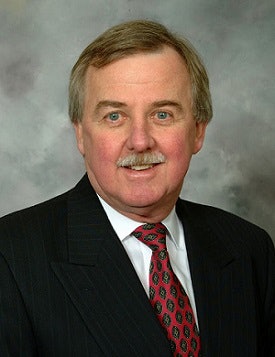Don LeDuc, president of the Western Michigan University’s Cooley Law School, has one piece of advice for students interested in entering the legal profession.
 Don LeDuc
Don LeDuc“Think like a professional from day one,” says LeDuc, who began teaching at the law school in 1975, served two stints as dean and was appointed President of the law school in 2002. “Act like the lawyer you hope to become.”
That means being prepared; taking responsibility for your own actions and anticipating the effect of those actions; treating people appropriately, respectfully and mindful of the demands on and limitations of others and “coming up with your own solution to problems; correcting misunderstandings and misinformation; and committing to your own personal growth and learning,” he says.
For LeDuc, who earned his law degree from Wayne State University and worked both in and outside of government, he is intent on challenging the perception of elitism within the legal profession.
“Shocking as it may seem these days, there are law schools, lawyers, and judges who believe strongly that certain people should not be admitted to law school—should not have the chance to obtain a legal education—often on the basis of a three-hour test that is not validated to predict anything more than first year success in law school,” says LeDuc.
Under his leadership, LeDuc has been credited with making the law school more open and inclusive, by broadening access to the university while also keeping the standards quite rigorous.
“We are committed to providing a legal education to people from all walks of life,” says LeDuc, adding that the law school has pushed back against “discriminatory and elitist” initiatives peddled by accrediting bodies. “We believe that the study of law should not be an esoteric pursuit and that the practice of law should not be an elist profession.”
LeDuc says that he is most proud of the school’s volunteer and pro bono efforts, including the Innocence Project and the way that the law school has led the way with full-time professors who teach, research and run legal clinics.
“At many law schools, legal writing and clinical faculty are treated as second-class faculty members,” says LeDuc. “But at our school, they are accorded the tenure-track status they deserve given their deep expertise and the importance of the subject matters they teach.”
LeDuc says that the ABA award-winning professional program, endorsed by the students, faculty, staff and alumni alike, encourages students to embrace professional behavior, promote an ethical school community, serve the community through volunteer and pro-bono efforts, and “recognize that everyone in the law school has a stake in educating students in the ways of professionalism,” says LeDuc, adding that the WMU-Cooley Innocence Project gained the exoneration and freedom for four wrongfully convicted men, one of who was imprisoned for serving almost 42 years.
LeDura Watkins was released on June 15, 2017, after WMU-Cooley Innocence Project filed a motion for a new trial. The Wayne County Prosecutor’s office decided to vacate the judgment of conviction and dismiss all charges against Watkins in the 1975 murder of a Detroit woman.
“Combined, these programs show why our students graduate better prepared for the practice of law than are students from many other schools,” says LeDuc.
LeDuc says that his law school has always favored the dreamers and embraces the notion that the best way for students to prove themselves is to give them the opportunity to do so.
“We believe that in the land of opportunity, opportunity should be the norm. We believe that access to legal education, like access to all education, is crucial to American democracy, now more than ever,” he says, adding that in an era that finds only 4.4% of lawyers to be of Black or African-American descent and only 5.6% of lawyers to be of Hispanic descent, “we believe that the legal profession will neither be fully integrated nor adequately serve the population of our country without providing reasonable access to minority candidates who aspire to join that profession.”
LeDuc said school administrators believe in access according to potential.
“We evaluate applicants to our school based on statistically established and validated standards; we expect those we admit to meet our rigorous academic standards,” he says. “We believe that the rewards of legal education are great and are worth the risks that students must take to seize the opportunity to gain the reward.
Now, 16 years into his role as president of the law school, LeDuc says that he’s proud of the work that he’s been able to achieve.
“I enjoy most the ability to empower others—including students, faculty, and staff—to learn, grow, advance, and achieve,” says LeDuc. “To hear that you have made a difference in the lives of others is about the highest compliment any professor or dean can receive.”
This article appeared in the July 12 issue of Diverse. It is one in a series of stories about law school deans.


















